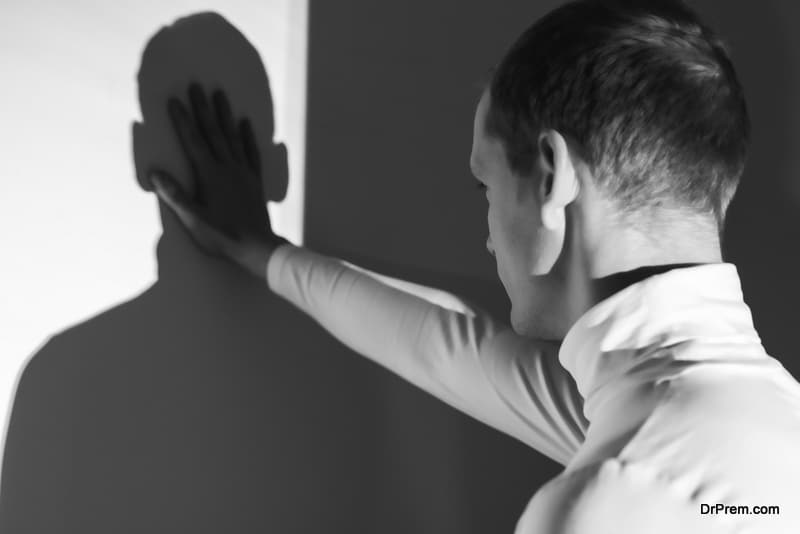Borderline Personality Disorder – not many people know about this psychological disorder, or there are the ones who have little knowledge regarding this disorder. Bipolar disorder is a very common term but not many are aware of its details.
To understand these, you first need to acquaint yourself with the major symptoms related to borderline personality disorder, which are the turbulent nature that makes it hard for the sufferers to maintain relationships or to stick to their jobs for a good period.
Borderline Personality disorder
People with BPD often display emotional outbursts ranging from verbal abuse to physical attacks and they tend to keep grudges. They hate and fear rejection and abandonment like anything but still they are too critical regarding their closest relations. They cannot experience stability in their emotions and behavior, like one moment they feel elated and the next moment they feel dejected. They cannot view other people as a mix of good and bad, it is either good or bad. They get fits of unbearable emptiness in which they try to harm themselves in every possible way, like drug addiction, reckless driving, cutting themselves, and eventually a suicide.
Many psychological theories support the fact that BPD is a problem that has its roots deep-seated in one’s childhood. This condition surfaces in a person because of some major childhood trauma. In majority of the cases but not all, it has been observed that people who have BPD also suffer from the Post Traumatic Stress Disorder. These people who have had traumatic experiences in their childhood continue to face their devastating effects, and this is how they develop Borderline Personality Disorder.
Rejection and abandonment scares BPD sufferers too much and this raises the level of destructiveness in them. BPD sufferers react abnormally, like one moment clinging to their loved one and the very next moment they withdraw themselves and provoke the partner for a fight, and this way they damage their relationships.
People suffering from BPD feel that they do not deserve love and they blame themselves for the fact that they never got love from their parents. They experience ambivalence, as in they want love and hate it too because they associate love with meanness and rejection.
BPD sufferers believe that they are bad and lack good qualities, so they indulge in self-destructive behavior. This behavior of theirs hurt other people also who are in close relation to them. The society calls these people troublemakers and the normal people of the society do not like them. Normal people fail to realize that the reason behind this behavior of BPD afflicted is the trauma that they must have faced back in their childhood. In most of the cases the trauma is related to family abuse.
Owing to the self-centered and kind of indifferent nature of parents the children feel unloved and avoidance. They do not give sufficient love to their children but they always expect their children to meet all their expectations and deal with them in a rigid way, which makes children feel that they are incompetent, helpless and bad.
Such an atmosphere makes a child too aggressive and they grow up into a person who has ambivalence, confusion, and sometimes they suffer from dissociation disorder. People suffering from BPD need special care and attention. Their family and friends can help them get over this disorder and live a happy life in many ways like to make them realize all their good qualities, so that the level of their self-esteem increases.
Even if they behave badly, the family and friends should maintain their calm and deal with them affectionately. You do intensive research on the very subject and therapies of Borderline Personality Disorder, so that you are in a much better position to understand the behavior of the person afflicted well and accordingly you can take steps to cure them. Encourage them to go in for therapies and BPD treatments.
Getting across and dealing with BPD in a relationship
Chaos, conflicts, frustrations, and intense feelings make a BPD relationship. The normal partners get hurt in a relationship with a BPD partner, while there are also some who have found a workable way to make their relationship better. If you are in a relationship with a person who has BPD or you have any plans to get into such a relationship, then make sure you first educate yourself on everything related to this disorder. The motive behind is to prepare yourself for all the consequences that might take place. This article intends to enlighten people on everything related to romantic bipolar disorder relationships.
The core feature that distinguishes a BPD relationship from a normal relationship is the presence of some serious interpersonal problems. They have a tendency to have unstable relationships. Their feelings and emotions frequently waver from one side to another, as in sometimes they feel a very strong urge to cling and depend on their partner, while at other times they want a sudden withdrawal. Other symptoms of BPD suicidal attempts, and impulsive behavior that makes it very tough, frustrating, and sometimes scary for the romantic partners to deal with them. Their abnormal behavior makes the relationship quite stressful.
Researches show that one of the reasons behind the BPD symptoms in a relationship is the large number of romantic relationships over a small period, and higher incidence of unplanned pregnancies in women is responsible for BPD in women. Although people who suffer from some other behavioral disorder also show some of the BPD symptoms, but one thing is for sure that people who have BPD have to struggle a lot in their romantic relationships.
Despite all the difficulties and tension BPD people create in romantic relationships, there is also a good side to them. No doubt, they are eccentric and frustrating at times, but they are also very loving, caring, and kind at other times. They have some very good and positive qualities also, that can make them great romantic partners. Many people who have been in a relationship with BPD partners have revealed that how passionate, exciting, and full of fun BPD partners are. BPD partners have a strong desire for intimacy and they often are good in bed.
Researchers have found out that most BPD relationships start off well, as the BPD person seems to be fully satisfied with the newfound love and partner and slowly starts to confide in that partner. They start taking their partner as someone who can save them from the pain and agony in their life. They give so much of importance to their new partner and make them feel very special because they feel that their partner is just perfect.
However, the problem sets in the day BPD people find even a single fault in their partner. Actually, people suffering from BPD have a dichotomous thinking, in other words, they can see things only in black and white. They find their partner’s behavior to be either good or a complete disaster. They find it extremely hard to withstand the mistakes that their partners do because they do not recognize the fact that everybody makes mistakes. Therefore, the day their partner commits even a small mistake, BPD partners start thinking that their partner is horrible.
BPD is a behavioral disorder that requires a proper treatment that should start with counseling. Being a partner of a BPD person, you are responsible to convince them to go under a treatment so they can regain the normal condition, and both the partners can enjoy the love relationship just as a normal couple does.
Coping and dealing with Bipolar Disorder
While studying BPD, it is equally important to know about bipolar disorder as it is very common but owing to lack of knowledge and information, we fail to deal/cope with it.
Bipolar disorder, commonly known as manic depression is a challenging mental illness that causes extreme highs and extreme lows in mood. People suffering from the illness go from very happy, up and active, to very sad and hopeless, down and inactive, then back again. They often have normal moods in between. The up feeling is called mania and the down feeling is depression.
During the maniac phase, a person may feel as if they have an endless supply of energy. On the other hand, when the depressive phase steps in, the affected person may feel down and low, lose interest in activities they once enjoyed, and may even become suicidal.
Nevertheless, It is difficult to live with bipolar disorder but is does not mean that you cannot lead a fulfilling and productive life. Understanding the signs and symptoms and seeking professional help are the first few steps to managing your illness and staying on track. However, beyond the treatment, there are many steps you can take to help yourself; including surrounding yourself with people you count on, making healthy lifestyle choices, and monitoring your moods.
Educate yourself about early symptoms
If you are well aware of the early symptoms of the onset of bipolar disorder, you can take preventive measures. Identifying certain stressors, time of year or other factors that trigger symptoms may help discover an emerging episode. There are many excellent sources of information on bipolar disorder.
Get as much information as you can from reputed websites or books. Find out about symptoms and treatments. Leaning more about it is the easiest way you can learn to overcome it. Read some good self-help books and get an in depth knowledge about the bipolar disorder and techniques to improve it. Help yourself as well as your family and friends to understand the illness you have. It would make it easy for you and others to help you cope with it.
Develop a healthy routine
When you break the routine, there are chances of running into the problem. This may sound boring but it is one part of the fact that it also makes you a healthy person. Get up in the morning, go to work, come home, eat healthy or do other activities you do on regular basis, get a good night sleep and stick to the routine. Our mind and body are easier to work with if they know what is coming their way.
Eat well balanced diet and get enough sleep. Stress free activities can bring about a great change in your daily routine. Practice yoga and meditation on regular basis as these could make you feel relaxed and focused. Make sure you work to keep a regular schedule, and to have positive mental and physical health.
Keep away from alcohol and drugs
During both, depressive and manic phases, drugs appear to be attractive options to slow down or to perk up. The potential damage to your mental and physical health could possibly affect your way to recovery. Bipolar disorder need not be chronic and recovery is possible. Great recovery tools are hope, love, support, and a routine of work.
Professional guidance
Most importantly, you should see a mental health professional who has enough experience in providing the treatment to the people who suffer from bipolar personality disorder. A health professional needs to do a complete mental health assessment, with questions about current symptoms, past history such as suicide attempts, medical history, relationships and family background such as childhood trauma.
How to deal with a bipolar person
Bipolar disorder is an illness like any other medical condition. If someone you know or care about, like a family member, friend or a colleague, is suffering from bipolar disorder, your love and support can go a long way. Here are a few ways to understand and deal with a bipolar person.
Learn about Bipolar Disorder
Equip yourself with knowledge and information about the disease. The more you know, the better prepared you are. Study about the disorder, what are the causes, the symptoms, the treatment options, dealing on a personal level and so on. Generally, bipolar disorder is misunderstood as a mental condition and the patient is not given due respect. It is important to understand that this disorder is a disease just like diabetes, etc. and it has to be treated accordingly. Mania and depression are two sides of the symptoms of this disease. Familiarize yourself with the symptoms. When affected person is talking about himself/herself too much, he/she may come across as a conceited person. On the contrary, this is a symptom of mania. Many a times, the symptoms of the disorder are misunderstood and are taken as the inherent personality traits of the person. So it is very important to learn about the disease on the very onset. Do not act like a layman while dealing with your loved ones.
Encourage the person to get help
Bipolar disorder is a real illness and it needs medical treatment like any other illness. The affected people are often reluctant to admit that they need medical attention as they feel embarrassed or are in a state of denial. If you notice that someone you care about is displaying any of the symptoms of the disease, talk to them, help them to come out of their shell and encourage them to see a specialist. If the person by no means want to admit to such a possibility, do not argue. You need to be sensitive with your loved ones. Instead of forcing them to see a specialist, suggest a routine medical check up. Meanwhile you can contact the suggested doctor and talk about your concerns about bipolar disorder. The affected person has to understand that without immediate medical attention, the condition can worsen.
Be patient and understanding
One thing is very important in dealing with a bipolar person and that is patience. You have to understand that bipolar disorder is nobody’s fault and it is of no use getting frustrated. Even if the person is undergoing medical treatment, he/she is not going to recover overnight. Managing bipolar disorder is a continuous process and so needs sheer patience. You need to be caring and supportive of a bipolar person. You need to constantly remind the person that you are there when he/she needs you. That you understand their problems and always are ready to help them. Compliment them on a regular basis. That will boost their confidence and hep them stabilize their behavior. Whenever possible, take part in their treatment. Go with them on visits to the doctor. Family therapy goes a long way in managing a bipolar person.
Accept the person’s limits
You will have to accept and understand that a bipolar person can not control his/her moods. Bipolar people can not simply snap out of their manic or depressed episodes on will. It is no use of shouting at them or asking them to stop acting the way they do. They can not control their moods through will power or self control. Do not expect anything extraordinary from such people. But again expecting too little can hinder recovery. So it is essential to strike a balance between encouraging independence and providing support. You also have to accept the fact that you cannot cure a bipolar person. It is not in your hands.
Communicate honestly
Having an open and frank communication with the affected goes a long way. Let the person know that he/she is not alone and that you are always there for him/her. Inquire from time to time how they are feeling and if they need to talk about anything. Always make an effort to answer their questions honestly. But at the same time, avoid arguing or engaging them in an intense conversation. During episodes, bipolar people often say hurtful things out of excitement which they do not actually mean. Do not take such comments personally. Avoid talking or arguing with them during such manic episodes.















